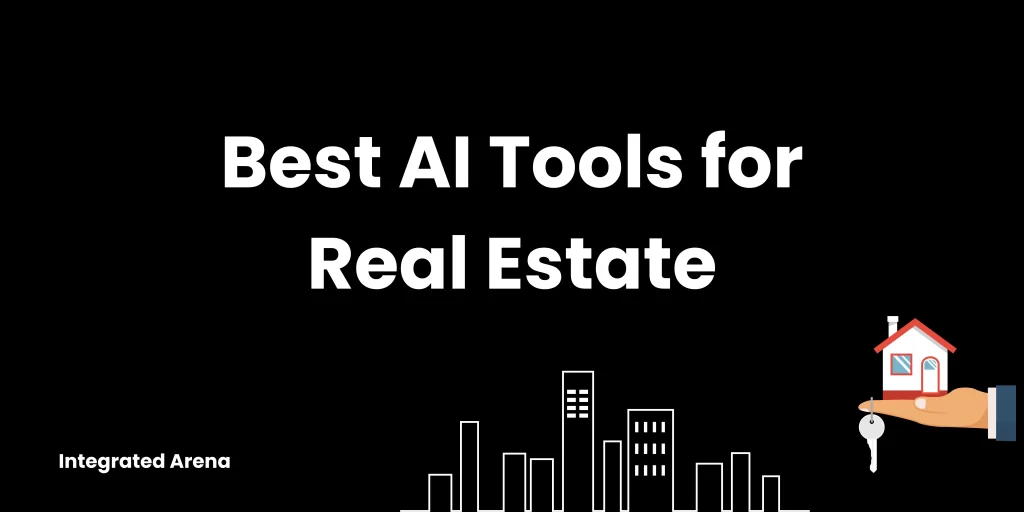Best AI tools for real estate include Zillow Premier Agent and HouseCanary. These tools enhance property search, valuation, and customer engagement.
Real estate professionals increasingly rely on AI tools to gain a competitive edge. Zillow Premier Agent helps agents connect with potential buyers and sellers. HouseCanary offers accurate property valuations and market insights. Both tools use machine learning to analyze large datasets, providing actionable insights.
These AI-driven platforms streamline processes, improving efficiency and decision-making. Real estate agents can better understand market trends and client needs. AI tools not only save time but also enhance client satisfaction. Adopting these technologies can lead to greater success in the real estate industry.
What is AI tool for Real Estate
Artificial Intelligence (AI) is changing the real estate industry. It helps in faster and more accurate decisions. AI tools are now essential for real estate professionals. These tools offer insights that were impossible before.
The Rise of AI
AI technology has grown quickly in recent years. Many industries use AI for better results. Real estate is no exception. AI helps in analyzing large amounts of data. This helps in making informed decisions.
Real estate agents use AI to find the best properties. They can also predict market trends. AI tools provide valuable insights. This makes the job of real estate agents easier and more efficient.
Impacts On The Property Market
AI impacts the property market in many ways. One major impact is on property valuation. AI can analyze various factors to determine property value. This includes location, market trends, and property condition.
Another impact is on marketing properties. AI helps in creating targeted marketing campaigns. This ensures that properties reach the right buyers. AI also helps in personalizing the buyer’s experience. This leads to higher customer satisfaction.
|
AI Tool |
Function |
|---|---|
|
Property Valuation |
|
|
Reonomy |
Market Analysis |
| Rex |
Customer Relationship Management |
AI is also improving property management. AI tools can predict maintenance issues. This helps in reducing downtime and costs.
Real estate investors use AI for making better investment decisions. AI tools can predict market changes. This helps investors in minimizing risks.
Ai For Property Valuation
Real estate professionals are leveraging AI tools to enhance property valuation. These advanced technologies provide accurate and efficient assessments of property values. Here, we explore two significant AI-driven methods:
Automated Valuation Models
Automated Valuation Models (AVMs) use algorithms to estimate property values. These models analyze large datasets, including:
- Historical sales data
- Property characteristics
- Neighborhood details
AVMs provide quick and reliable property valuations. They eliminate human bias and reduce the time required for valuation. Real estate agents and appraisers benefit from these precise, data-driven insights.
Predictive Pricing Analytics
Predictive Pricing Analytics utilize AI to forecast future property prices. These tools analyze various factors such as:
- Market trends
- Economic indicators
- Local development plans
Predictive analytics help investors make informed decisions. They identify potential market shifts and investment opportunities. This leads to strategic planning and higher returns on investment.
Incorporating AI into property valuation transforms the real estate landscape. Professionals gain access to more accurate and timely information.
Enhancing Property Search
In the real estate world, finding the perfect property can be tough. With AI tools, searching becomes easier and faster. These tools help users find the best properties based on their needs. They save time and make the process enjoyable.
Intelligent Filtering Systems
Intelligent filtering systems use AI algorithms to sort properties. They consider various factors like price, location, and size. Users can set their preferences and get tailored results. This ensures they see only relevant properties.
These systems can also learn from user behavior. As users search, the system gets better at understanding their needs. This makes the search results more accurate over time.
| Feature | Description |
|---|---|
| Price Filters | Set a budget range to find affordable properties. |
| Location Filters | Choose specific areas or neighborhoods. |
| Property Type | Filter by type: house, apartment, condo, etc. |
| Size Filters | Set minimum and maximum square footage. |
Virtual Property Tours
Virtual property tours let buyers explore homes online. Using AI and VR technology, users can walk through properties from their devices. This saves time and provides a real feel of the property.
These tours often include interactive features. Users can click on rooms to get more details. They can also measure spaces and visualize furniture placement. This adds an extra layer of convenience.
- Explore properties anytime, from anywhere.
- Get a realistic view without traveling.
- Interactive elements enhance the experience.
AI tools like intelligent filtering systems and virtual tours are revolutionizing real estate. They make property search efficient and user-friendly.
AI In Real Estate Marketing
Artificial Intelligence (AI) is transforming real estate marketing. This technology brings efficiency and precision. Real estate professionals can now reach the right audience. This means better engagement and higher sales. Let’s explore how AI aids in real estate marketing.
Targeted Advertising
AI helps in creating targeted ads. These ads reach the right people. AI analyzes data to find potential buyers. It considers their preferences and behaviors. This ensures ads are relevant. It also reduces ad spend wastage.
AI tools can predict buyer intent. They show ads to those ready to buy. This increases conversion rates. Real estate agents can customize their campaigns. They can focus on specific demographics. This means more effective advertising.
Content Creation And Management
AI can create engaging content. It writes property descriptions. It generates blog posts and social media updates. This saves time for real estate agents. AI tools can also manage content. They schedule posts and track performance.
These tools ensure consistent and high-quality content. They analyze what type of content works best. This helps in creating more effective marketing strategies. AI tools also optimize content for SEO. This improves search engine rankings.
Chatbots And Customer Service
Chatbots have revolutionized customer service in real estate. They handle inquiries efficiently and provide personalized interactions. Let’s explore how chatbots improve customer service.
24/7 Inquiry Handling
Real estate chatbots can handle inquiries 24/7. This ensures no potential client is left unattended. Agents can focus on more complex tasks, increasing overall productivity.
| Time | Agent Availability | Chatbot Availability |
|---|---|---|
| Morning | Yes | Yes |
| Afternoon | Yes | Yes |
| Evening | Limited | Yes |
| Night | No | Yes |
Personalized Client Interactions
Chatbots use AI to offer personalized client interactions. They remember client preferences and provide tailored suggestions. This enhances the client experience.
- Remembering client preferences
- Providing tailored property suggestions
- Offering personalized follow-ups
Chatbots can adapt their responses based on previous interactions. This makes clients feel valued and understood. They can also automate follow-up messages, ensuring no client is forgotten.
Predictive Analytics For Investors
In the world of real estate, predictive analytics has become a game-changer for investors. By using advanced AI tools, investors can now make smarter decisions. These tools analyze vast amounts of data, predicting future trends and risks. Let’s explore how predictive analytics can help investors in real estate.
Market Trend Analysis
One of the main advantages of predictive analytics is market trend analysis. AI tools can sift through historical data to identify patterns. These patterns reveal future market trends. Investors can see which neighborhoods are growing. They can also identify areas where property values are likely to increase. This information helps investors choose the best locations for their investments.
Here is how market trend analysis works:
- Gather data from various sources (e.g., sales records, economic reports).
- Analyze data to find patterns and correlations.
- Predict future trends based on historical patterns.
Investment Risk Assessment
Investment risk assessment is another crucial aspect of predictive analytics. AI tools help investors assess the risks associated with different properties. These tools evaluate factors like market volatility, neighborhood stability, and property conditions. By understanding these risks, investors can make informed decisions.
Here’s a simple table to summarize key risk factors:
| Risk Factor | Description |
|---|---|
| Market Volatility | How much the market fluctuates over time. |
| Neighborhood Stability | How stable and safe the neighborhood is. |
| Property Condition | The current state and quality of the property. |
With these insights, investors can avoid high-risk properties and focus on safer investments. This leads to better returns and fewer losses.
Operational Efficiency With Ai
Operational efficiency in real estate has been revolutionized by AI tools. These tools streamline processes, save time, and reduce costs. Real estate professionals can now focus on high-value tasks. Below, we explore how AI enhances operational efficiency.
Smart Contract Management
AI tools simplify contract management. They automate the creation and review of contracts. This reduces errors and speeds up the process. AI can also ensure compliance with legal standards.
AI contract management systems offer:
- Automated document creation
- Real-time updates
- Risk assessment
- Compliance checks
These features make contract management efficient and reliable. It frees up time for real estate agents to focus on client relations.
Maintenance Request Automation
Handling maintenance requests can be time-consuming. AI automates this task, ensuring prompt responses. Tenants can log issues through an app. The AI system then assigns the task to the right personnel.
Key benefits of AI in maintenance request automation include:
- 24/7 request logging
- Automatic task assignment
- Real-time updates
- Efficient tracking and reporting
These features ensure timely maintenance, improving tenant satisfaction. It also reduces the workload for property managers.
Future Of Real Estate And Ai
The real estate industry is evolving rapidly. The integration of AI tools is reshaping how properties are bought, sold, and managed. The future of real estate and AI is promising and transformative.
Emerging Technologies
AI tools are bringing new technologies to real estate. Machine learning algorithms can predict property values accurately. Chatbots provide instant responses to potential buyers, enhancing customer service. Virtual reality (VR) allows buyers to tour homes remotely. Blockchain ensures secure and transparent transactions.
| Technology | Function |
|---|---|
| Machine Learning | Predict property values |
| Chatbots | Enhance customer service |
| Virtual Reality | Remote home tours |
| Blockchain | Secure transactions |
Ethical Considerations
AI in real estate raises ethical questions. Privacy is a major concern. AI tools collect vast amounts of data. Ensuring data security is essential. Bias in algorithms can lead to unfair practices. Developers must address these biases. Transparency in AI decision-making processes is crucial.
- Privacy: Protecting personal data
- Data Security: Safeguarding information
- Bias: Ensuring fair algorithms
- Transparency: Clear decision-making processes
Frequently Asked Questions
What Is The Best Use Of Ai In Real Estate?
The best use of AI in real estate is predictive analytics. It helps forecast market trends, property values, and buyer behavior. AI streamlines property management, automates customer service, and enhances marketing strategies. This increases efficiency and improves decision-making for real estate professionals.
What Are Realtors Using AI For?
Realtors use AI for property recommendations, market analysis, customer relationship management, and virtual tours. AI helps streamline operations, improve client interactions, and enhance decision-making processes in real estate transactions.
How To Use AI To Find Real Estate Deals?
Use AI to analyze market trends, property values, and neighborhood data. Identify undervalued properties and forecast future growth. Leverage AI tools for lead generation and automated property searches. Use chatbots for quick responses to inquiries. Integrate AI with CRM for better deal management.
Wrapping-up: Best AI Tools for Real Estate
Choosing the best AI tools for real estate can transform your business. They streamline tasks and enhance decision-making. Embrace these technologies to stay competitive. With the right AI tools, you can improve efficiency and client satisfaction. Stay ahead in the real estate market by leveraging advanced AI solutions.
Read more:



